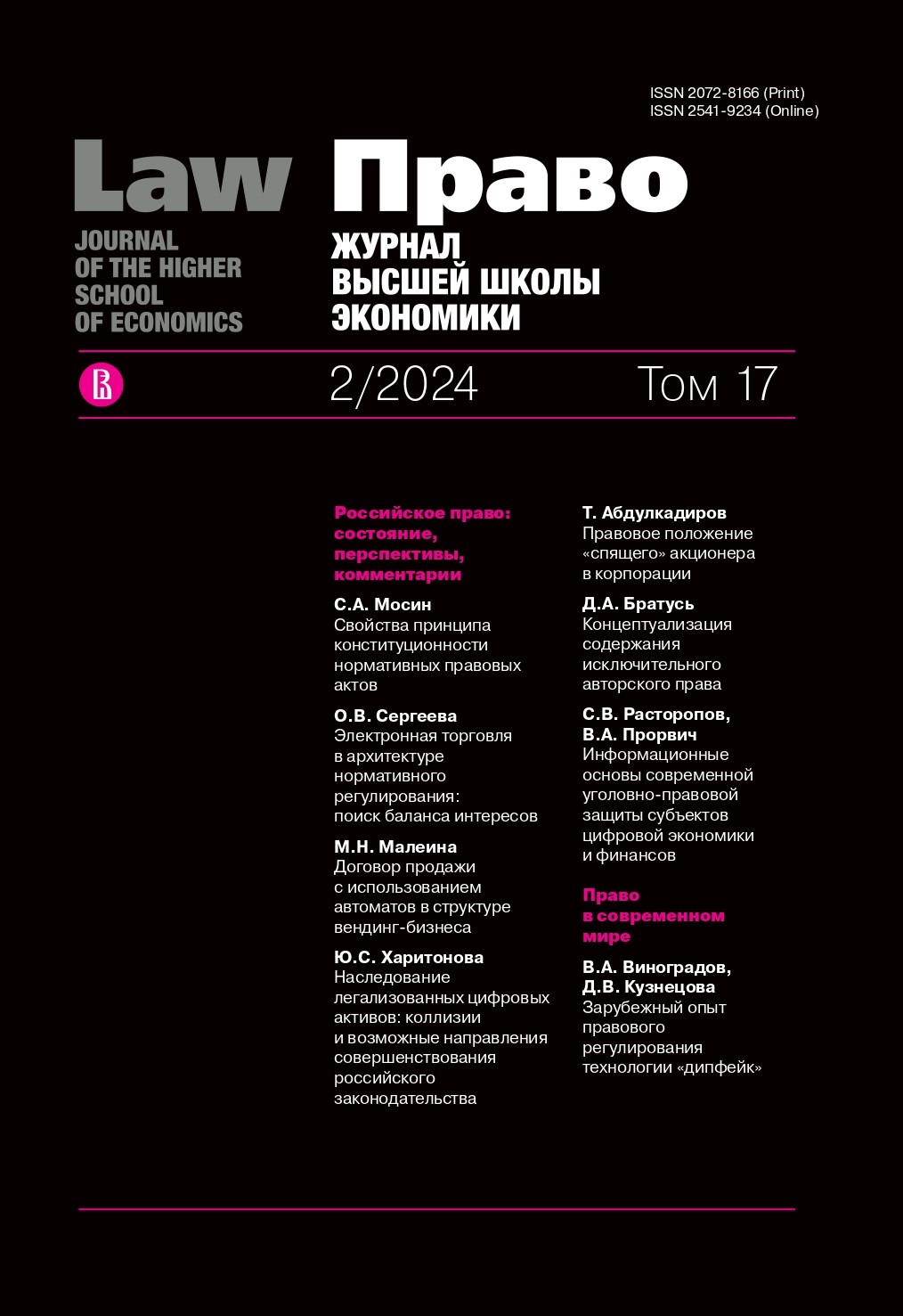Договор продажи с использованием автоматов в структуре вендинг-бизнеса
Аннотация
Вендинг-бизнес рассматривается как вид инновационной предпринимательской деятельности. Эта сфера включает несколько групп отношений между производителем вендинговых автоматов и покупателем автоматов; собственником автоматов и оператором, осуществляющим их использование; оператором и юридическим лицом по размещению автоматов; оператором и юридическим лицом по закупке товаров для реализации, закупке материалов для выполнения работы, оказания услуги посредством автоматов; оператором и юридическим лицом по ремонту автоматов; оператором и потребителем в купле-продаже, мене товаров, выполнении работ, оказании услуг, временном пользовании имуществом; оператором фандомата как покупателем использованной тары и гражданином-продавцом; собственником вендинговых автоматов (производителем, оператором) и третьим лицом (не стороной договора) в роли нарушителя или потерпевшего; между операторами, а также между каждым оператором и саморегулируемой организацией в этой области. Предлагается расширить область применения вендинга, включив в нее помимо купли-продажи обмен, временное пользование, оказание услуг, выполнение работ, пожертвование. Центральный договор розничной купли-продажи характеризуется в статье как соглашение, в силу которого продавец (оператор) без присутствия с использованием вендинг-автомата обязуется передать в собственность покупателю товар, предназначенный для использования, не связанного с предпринимательской деятельностью, после совершения покупателем действий по оплате и выбору товара, а покупатель оплачивает товар. Автором выделены проблемы, связанные с заключением и исполнением договора продажи с использованием автоматов (форма договора, обеспечение качества и безопасности товара, размер платы за товар, сохранение персональных данных покупателя), и показаны способы их решения. Обосновывается закрепление в законе перечня товаров, продажа которых недопустима через автоматы или запрещена для продажи в определенных местах. В исследовании применены общенаучные методы, а также системный и логический анализ литературы, российского законодательства, метод сравнительного правоведения.
Литература
Abramov V.Yu., Abramov Yu.V. (2023) Legal regulation of new types of business activities: a guide. Moscow: Justitcinform, 320 p. (in Russ.)
Abramova E.N., Averchenko N.N., Arslanov K.M. et al. (2010) Commentary on the Civil Code of the Russian Federation. Moscow: Prospekt. 992 p. (in Russ.)
Fadeeva Z.O. (2020) Development trends of vending in Russia. In: Consumer market of Eurasia in the Eurasian Economic Union and the WTO. Papers of international forum. Yekaterinburg: University, pp. 188-192 (in Russ.)
Filippova E.N., Osipova L.V. (2020) Vending under Russian legislation. In: Fundamental science and technology: promising developments. Papers of XXI international conference. Morrisville: Lulu Press, pp. 106-109 (in Russ.)
Gruber S. et al. (2005) The Commodity Vending Machine. FORUM WARE international, no. 2. Available at: https://www.researchgate.net/publication/265079551_the_commodity_vending_machine
Haberman C. (1985) Japanese puzzle: the vending machine murders. New York Times. Dec.10.
Kosareva O.A., Khramova A.V. (2023) Assortment of pharmaceutical products in the vending sale. Vestnik akademii=Bulletin of the Academy, no. 2, pp. 7-15 (in Russ.)
Kuteynikov D.L. et al. (2019) Regulation of human interaction with autonomous technical means: discussion about legal regimes. Russian law=Lex Russica, no. 9, pp. 85-95 (in Russ.) DOI: https://doi.org/10.17803/1729-5920.2019.154.9.085-095
Lebedeva A.A. (2017) Trade through vending machines in modern Russia. Bezopasnost biznesa=Business Security, no. 5, pp. 8-12 (in Russ.)
Lemeshko A.M., Lemeshko M.A. (2016) Vending machine for accepting donations in charitable sector. Upravleniye innovatsiyami=Innovation management, no. 19, pp. 100-103 (in Russ.)
Lukashova A.S. (2019) Vending trade: regulation and development prospects. Yuridicheskaya nauka= Legal Science, no. 8, pp. 38-41 (in Russ.)
Petrenko A.S., Osipova Yu.V. (2016) Specifics of vending in the hospitality area. Gumanitarnyye i sotsial'no-ekonomicheskiye nauki=Humanities and Social-Economic Researches, no. 4, pp. 87-91 (in Russ.)
Ratnasri N., Sharmilan T. (2021) Vending machine technologies: a review. International Journal of Sciences Basic and Applied Research, no. 2, pp. 160-166.
Rohr J. (2019) Smart contracts in traditional contract law, or the law of the vending machines. Cleveland State Law Review, vol. 67, no.1, pp. 67-87.
Sergeeva S.N., Uchaeva O.A. (2023) Legal aspects of vending. In: II international forum on sustainable development. Collection of papers. Petrozavodsk: Novaya nauka, pp. 8-15 (in Russ.)
Wolfe R. (2023) Tipping at Self-Checkout Has Customers Crying ‘Emotional Blackmail'. The Wall Street Journal. May 9.
Zakharov A.V. (2013) Bibliovending: foreign experience, conceptual solution for the Russian market. Bibliosfera=Bibliosphere, no. 1, pp. 48-51 (in Russ.)


















